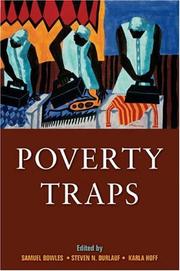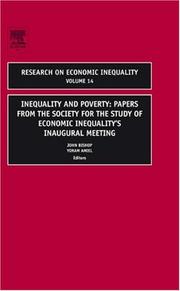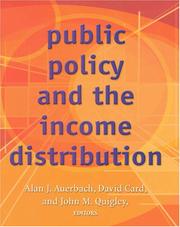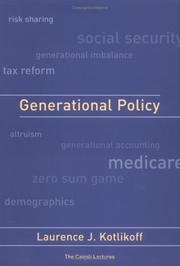| Listing 1 - 10 of 30 | << page >> |
Sort by
|
Book
ISBN: 9780199653591 9780199215911 019921591X 019155071X 9780191550713 1281769991 9781281769992 9780191808579 0191808571 9786611769994 6611769994 0191607576 0199653593 Year: 2008 Publisher: Oxford ; New York : Oxford University Press,
Abstract | Keywords | Export | Availability | Bookmark
 Loading...
Loading...Choose an application
- Reference Manager
- EndNote
- RefWorks (Direct export to RefWorks)
Many philosophers now define social justice in terms of equal opportunities and economists have incorporated such notions in a new kind of welfare economics in which personal responsibility plays a key role. This book takes a critical perspective and combines philosophical scrutiny with economic analysis to elaborate on these recent developments. - ;What is a fair distribution of resources and other goods when individuals are partly responsible for their achievements? This book develops a theory of fairness incorporating a concern for personal responsibility, opportunities and freedom. With a
Social justice --- Welfare economics --- Responsibility --- Distribution (Economic theory) --- Sociological theories --- Political philosophy. Social philosophy --- General ethics --- Social policy --- Income --- 330.56 --- Economic policy --- Economics --- Equality --- Justice --- Accountability --- Moral responsibility --- Obligation --- Ethics --- Supererogation --- 330.56 Nationaal inkomen. Volksinkomen. Gezinsinkomen. Vermogensstratificatie. Particuliere inkomens en bestedingen. Armoede. Honger --- Nationaal inkomen. Volksinkomen. Gezinsinkomen. Vermogensstratificatie. Particuliere inkomens en bestedingen. Armoede. Honger --- Responsibility. --- Social justice. --- Welfare economics.

ISBN: 0691125007 0691170932 9786613291035 1283291037 1400841291 9780691125008 9781400841295 9780691125007 Year: 2006 Publisher: New York Princeton, N.J. Russell Sage Foundation Princeton University Press
Abstract | Keywords | Export | Availability | Bookmark
 Loading...
Loading...Choose an application
- Reference Manager
- EndNote
- RefWorks (Direct export to RefWorks)
Much popular belief--and public policy--rests on the idea that those born into poverty have it in their power to escape. But the persistence of poverty and ever-growing economic inequality around the world have led many economists to seriously question the model of individual economic self-determination when it comes to the poor. In Poverty Traps, Samuel Bowles, Steven Durlauf, Karla Hoff, and the book's other contributors argue that there are many conditions that may trap individuals, groups, and whole economies in intractable poverty. For the first time the editors have brought together the perspectives of economics, economic history, and sociology to assess what we know--and don't know--about such traps. Among the sources of the poverty of nations, the authors assign a primary role to social and political institutions, ranging from corruption to seemingly benign social customs such as kin systems. Many of the institutions that keep nations poor have deep roots in colonial history and persist long after their initial causes are gone. Neighborhood effects--influences such as networks, role models, and aspirations--can create hard-to-escape pockets of poverty even in rich countries. Similar individuals in dissimilar socioeconomic environments develop different preferences and beliefs that can transmit poverty or affluence from generation to generation. The book presents evidence of harmful neighborhood effects and discusses policies to overcome them, with attention to the uncertainty that exists in evaluating such policies.
Poverty. --- National wealth --- Social stratification --- Social problems --- Poverty --- 330.56 --- 330.56 Nationaal inkomen. Volksinkomen. Gezinsinkomen. Vermogensstratificatie. Particuliere inkomens en bestedingen. Armoede. Honger --- Nationaal inkomen. Volksinkomen. Gezinsinkomen. Vermogensstratificatie. Particuliere inkomens en bestedingen. Armoede. Honger --- Destitution --- Wealth --- Basic needs --- Begging --- Poor --- Subsistence economy --- Economic history. --- Economic conditions --- History, Economic --- Economics
Book
ISBN: 9780674919310 0674919319 9780674242029 0674242025 9780674242036 0674242033 9780674242043 0674242041 Year: 2019 Publisher: Cambridge, MA : Harvard University Press,
Abstract | Keywords | Export | Availability | Bookmark
 Loading...
Loading...Choose an application
- Reference Manager
- EndNote
- RefWorks (Direct export to RefWorks)
Many fear that efforts to address inequality will undermine the economy as a whole. But the opposite is true: rising inequality has become a drag on growth and an impediment to market competition. Heather Boushey breaks down the problem and argues that we can preserve our nation's economic traditions while promoting shared economic growth.
Wealth --- Income distribution --- Competition --- United States --- Economic conditions --- 330.56 --- 330.56 Nationaal inkomen. Volksinkomen. Gezinsinkomen. Vermogensstratificatie. Particuliere inkomens en bestedingen. Armoede. Honger --- Nationaal inkomen. Volksinkomen. Gezinsinkomen. Vermogensstratificatie. Particuliere inkomens en bestedingen. Armoede. Honger --- Wealth - United States --- Income distribution - United States --- Competition - United States --- United States - Economic conditions - 2009 --- -330.56 --- -Income distribution

ISBN: 9781849504621 1849504628 0762313749 9786611049133 1281049131 0080489605 9780080489605 9780762313747 Year: 2007 Publisher: Oxford, UK ; San Diego, CA : Elsevier JAI,
Abstract | Keywords | Export | Availability | Bookmark
 Loading...
Loading...Choose an application
- Reference Manager
- EndNote
- RefWorks (Direct export to RefWorks)
This volume is a collection of papers presented at the first meeting of the Society for the Study of Economic Inequality (ECINEQ). The Societys aims are to provide an international forum for all researchers interested in the study of economic inequality and related fields, bringing together the diversity of perspectives. The conference was held in Palma de Mallorca, Spain in July 2005. Over eighty parallel sessions were offered, providing novel and interesting work from both mature scholars and as well as new PhDs. With so much quality work from which to choose, it was necessary to limit the scope of Research on Economic Inequality, Volume 14.The first five papers all employ Spanish data and cover topics such as child poverty, social preferences toward redistribution, social exclusion, and multidimensional poverty. The next three papers examine inequality in the EU using alternative methodologies. Chapter Nine explores poverty dynamics among the elderly in Italy. Chapter Ten presents and extends the state of the art in multidimensional inequality measurement. Chapters Eleven and Twelve contribute to the theoretical underpinnings of inequality measurement. Chapters Thirteen through Fifteen contain analytical papers focused on evaluating the effects of public policy on poverty and inequality. The final two chapters use the questionnaire-experimental approach to examine individuals distributional preferences.This book is part of the Research on Economic Inequality series. It presents papers form the inaugural meeting of the Society for the Study of Economic Inequality (ECINEQ). It provides an international forum for all researchers interested in the study of economic inequality and related fields. It brings together a diversity of perspectives.
Income distribution --- Poverty --- 330.56 --- 330.56 Nationaal inkomen. Volksinkomen. Gezinsinkomen. Vermogensstratificatie. Particuliere inkomens en bestedingen. Armoede. Honger --- Nationaal inkomen. Volksinkomen. Gezinsinkomen. Vermogensstratificatie. Particuliere inkomens en bestedingen. Armoede. Honger --- Business & Economics --- Social Science --- Macroeconomics. --- Inequality --- Economics --- General. --- Egalitarianism --- Social equality --- Social inequality --- Political science --- Sociology --- Democracy --- Liberty --- Equality

ISBN: 0521461316 0521466962 0511011326 1280151838 0511116136 0511323344 051149226X 0511052936 0511152310 1107112370 9780511011320 9780511116131 9780511492266 9786610151837 6610151830 9780521461313 9780521466967 9781107112377 9780511152313 9780511052934 9780511323348 9781280151835 Year: 1999 Publisher: Cambridge : Cambridge University Press,
Abstract | Keywords | Export | Availability | Bookmark
 Loading...
Loading...Choose an application
- Reference Manager
- EndNote
- RefWorks (Direct export to RefWorks)
What is inequality? In the late 1990s there was an explosion of interest in the subject that yielded a substantial body of formal tools and results for income-distribution analysis. Nearly all of this is founded on a small set of core assumptions - such as the Principle of Transfers, scale independence, the population principle∑ - that are used to give meaning to specific concepts of inequality measurement, inequality ranking and, indeed, to inequality itself. But does the standard axiomatic structure coincide with public perceptions of inequality? Or is the economist's concept of inequality a thing apart, perpetuated through serial brainwashing in the way the subject is studied and taught? In this 1999 book, Amiel and Cowell examine the evidence from a large international questionnaire experiment using student respondents. Along with basic 'cake-sharing' issues, related questions involving social-welfare rankings, the relationship between inequality and overall income growth and the meaning of poverty comparisons are considered.
Income distribution --- Equality --- Poverty --- 330.56 --- Nationaal inkomen. Volksinkomen. Gezinsinkomen. Vermogensstratificatie. Particuliere inkomens en bestedingen. Armoede. Honger --- Equality. --- Income distribution. --- Poverty. --- Economic Theory --- Business & Economics --- Business, Economy and Management --- Economics --- 330.56 Nationaal inkomen. Volksinkomen. Gezinsinkomen. Vermogensstratificatie. Particuliere inkomens en bestedingen. Armoede. Honger --- Destitution --- Egalitarianism --- Inequality --- Social equality --- Social inequality --- Distribution of income --- Income inequality --- Inequality of income --- Wealth --- Basic needs --- Begging --- Poor --- Subsistence economy --- Distribution (Economic theory) --- Disposable income --- Political science --- Sociology --- Democracy --- Liberty

ISBN: 0871540460 9780871540461 9781610440202 161044020X Year: 2006 Publisher: New York Russell Sage Foundation
Abstract | Keywords | Export | Availability | Bookmark
 Loading...
Loading...Choose an application
- Reference Manager
- EndNote
- RefWorks (Direct export to RefWorks)
Economic assistance, Domestic --- Economic security --- Poverty --- Income distribution --- United States --- Social policy --- Public administration --- Social problems --- Income --- 330.56 --- 330.56 Nationaal inkomen. Volksinkomen. Gezinsinkomen. Vermogensstratificatie. Particuliere inkomens en bestedingen. Armoede. Honger --- Nationaal inkomen. Volksinkomen. Gezinsinkomen. Vermogensstratificatie. Particuliere inkomens en bestedingen. Armoede. Honger --- Anti-poverty program (United States) --- Social policy. --- Economic assistance [Domestic ] --- Economic assistance, Domestic - United States --- Economic security - United States --- Poverty - United States --- Income distribution - United States --- United States - Social policy
Book
ISBN: 9781107014039 9781107601604 9781139012980 1107601606 1107014034 1107235006 1139012983 1139526014 1139527215 1139528408 1139530682 1139531875 113953999X 1283528452 9786613840905 Year: 2012 Publisher: Cambridge : Cambridge University Press,
Abstract | Keywords | Export | Availability | Bookmark
 Loading...
Loading...Choose an application
- Reference Manager
- EndNote
- RefWorks (Direct export to RefWorks)
Economists warn that policies to level the economic playing field come with a hefty price tag. But this so-called 'equality-efficiency trade-off' has proven difficult to document. The data suggest, instead, that the extraordinary levels of economic inequality now experienced in many economies are detrimental to the economy. Moreover, recent economic experiments and other evidence confirm that most citizens are committed to fairness and are willing to sacrifice to help those less fortunate than themselves. Incorporating the latest results from behavioral economics and the new microeconomics of credit and labor markets, Bowles shows that escalating economic disparity is not the unavoidable price of progress. Rather it is policy choice - often a very costly one. Here drawing on his experience both as a policy advisor and an academic economist, he offers an alternative direction, a novel and optimistic account of a more just and better working economy.
Social policy --- Social security law --- Business and economics --- Fairness. --- BUSINESS & ECONOMICS / Economics / Microeconomics. --- Impartiality --- Fairness --- Income distribution --- BUSINESS & ECONOMICS / Economics / Microeconomics --- 330.56 --- Distribution of income --- Income inequality --- Inequality of income --- Distribution (Economic theory) --- Disposable income --- Conduct of life --- Justice --- 330.56 Nationaal inkomen. Volksinkomen. Gezinsinkomen. Vermogensstratificatie. Particuliere inkomens en bestedingen. Armoede. Honger --- Nationaal inkomen. Volksinkomen. Gezinsinkomen. Vermogensstratificatie. Particuliere inkomens en bestedingen. Armoede. Honger --- Microeconomics --- Income distribution. --- Business & economics --- Economics --- Microeconomics. --- Business, Economy and Management

ISBN: 0262277530 1423725220 0262263378 9780262277532 9780262263375 9781423725220 0262112833 9780262112833 Year: 2003 Publisher: Cambridge, Mass. : MIT Press,
Abstract | Keywords | Export | Availability | Bookmark
 Loading...
Loading...Choose an application
- Reference Manager
- EndNote
- RefWorks (Direct export to RefWorks)
How generational policy affects the sustainability of a government's fiscal policy.In these eight 2002 Cairoli Lectures, presented at the Universidad Torcuato di Tella in Buenos Aires, Argentina, Laurence Kotlikoff shows how generational policy works, how it is measured, and how much it matters. Kotlikoff discusses the incidence and measurement of generational policy, the relationship of generational policy to monetary policy, and the vacuity of deficits, taxes, and transfer payments as economic measures of fiscal policy. Kotlikoff also illustrates generational policy's general equilibrium effects with a dynamic life-cycle simulation model and reviews the empirical evidence testing intergenerational altruism and risk sharing. The lectures were delivered as Argentina faced a devastating depression triggered, in large part, by unsustainable generational policy. Throughout the book, Kotlikoff connects his messages about generational policy to the Argentine situation and the Argentine government's policy mistakes.
Economic policy. --- Argentina --- Economic conditions --- Economic nationalism --- Economic planning --- National planning --- State planning --- Economics --- Planning --- National security --- Social policy --- ECONOMICS/Macroeconomics --- SOCIAL SCIENCES/Political Science/Public Policy & Law --- Economic policy --- 339.520982 --- 303.8 --- 339.111 --- AA / International- internationaal --- 330.56 --- Econometrische behandeling van een onderwerp --- Openbaar vermogen. Onteigeningen. Provinciaal en gemeentelijk domein --- Nationaal inkomen. Volksinkomen. Gezinsinkomen. Vermogensstratificatie. Particuliere inkomens en bestedingen. Armoede. Honger --- 330.56 Nationaal inkomen. Volksinkomen. Gezinsinkomen. Vermogensstratificatie. Particuliere inkomens en bestedingen. Armoede. Honger

ISBN: 9780511492549 9780521827607 9781107402812 0511265239 9780511265235 9780511265952 0511265956 0511262086 9780511262081 0511263686 9780511263682 9786610749980 6610749981 0521827604 0511492545 0521827604 1107160170 1280749989 0511317603 0511264518 1107402816 Year: 2004 Publisher: Cambridge : Cambridge University Press,
Abstract | Keywords | Export | Availability | Bookmark
 Loading...
Loading...Choose an application
- Reference Manager
- EndNote
- RefWorks (Direct export to RefWorks)
Labour markets in North America and Europe have changed tremendously in the face of increased globalisation and technical progress, raising important challenges for policy makers concerned with equality of opportunity. Originally published in 2004, this book examines the influence of both changes in income inequality and of social policies on the degree to which economic advantage is passed on between parents and children in the rich countries. Standard theoretical models of generational dynamics are extended to examine generational income and earnings mobility over time and across space. Over twenty contributors from North America and Europe offer comparable estimates of the degree of mobility, changes in mobility, and the impact of government policy. In so doing, they strengthen the analytical tool kit used in the study of generational mobility, and offer insights for research and directions in dealing with equality of opportunity and child poverty.
Income distribution --- Social mobility --- 330.56 --- 331.2 --- 331 --- 330.56 Nationaal inkomen. Volksinkomen. Gezinsinkomen. Vermogensstratificatie. Particuliere inkomens en bestedingen. Armoede. Honger --- Nationaal inkomen. Volksinkomen. Gezinsinkomen. Vermogensstratificatie. Particuliere inkomens en bestedingen. Armoede. Honger --- 331 Arbeid. Labour economics. Arbeidseconomie --- Arbeid. Labour economics. Arbeidseconomie --- 331.2 Loon. Salaris. Vergoeding --(algemeen) --- Loon. Salaris. Vergoeding --(algemeen) --- Mobility, Social --- Sociology --- Distribution of income --- Income inequality --- Inequality of income --- Distribution (Economic theory) --- Disposable income --- Business, Economy and Management --- Economics

ISBN: 0415095441 0415124298 041512431X 0415124301 9786610170869 0203980131 1280170867 1134803850 9786610288861 1134803788 1280288868 0203978927 9780415124300 9781134803781 9781280288869 9780203980132 9780203978924 9781134803736 9781134803774 9780415124317 9781134803804 9781134803842 9781134803859 9780415095440 9780415124294 113480377X 1134803842 Year: 1996 Publisher: London ; New York : Routledge,
Abstract | Keywords | Export | Availability | Bookmark
 Loading...
Loading...Choose an application
- Reference Manager
- EndNote
- RefWorks (Direct export to RefWorks)
Over the last decade, the theory that poverty in the world's poorest regions could be alleviated by providing small loans to micro-entrepreneurs has become increasingly popular. This volume examines the effectiveness of this theory when put into practice. The book presents empirical evidence drawn from comparative experiences in seven developing countries and produces some startling conclusions. This work should be essential reading for all those interested in development, poverty-reduction, social welfare and finance. Volume One provides a detailed analysis of this theory an
Private finance --- Development aid. Development cooperation --- Developing countries --- Poverty --- Finance --- Economic development --- Pauvreté --- Finances --- Développement économique --- Debt financing (Corporations). --- Public welfare. --- Business. --- 330.56 --- 336.7 --- Nationaal inkomen. Volksinkomen. Gezinsinkomen. Vermogensstratificatie. Particuliere inkomens en bestedingen. Armoede. Honger --- Geldwezen. Kredietwezen. Bankwezen. Financien. Monetaire econonomie. Beurswezen --- 336.7 Geldwezen. Kredietwezen. Bankwezen. Financien. Monetaire econonomie. Beurswezen --- 330.56 Nationaal inkomen. Volksinkomen. Gezinsinkomen. Vermogensstratificatie. Particuliere inkomens en bestedingen. Armoede. Honger --- Debt financing (Corporations) --- Economic conditions. --- Pauvreté --- Développement économique --- Economic policy. --- Corporations --- Corporate debt --- Poverty - Developing countries. --- Business & Economics --- Economic History --- Entrepreneurship. --- Finance. --- Government lending. --- Political aspects. --- Poverty. --- average --- loan --- size --- grameen --- bank --- rural --- credit --- market --- financial --- institutions
| Listing 1 - 10 of 30 | << page >> |
Sort by
|

 Search
Search Feedback
Feedback About
About Help
Help News
News